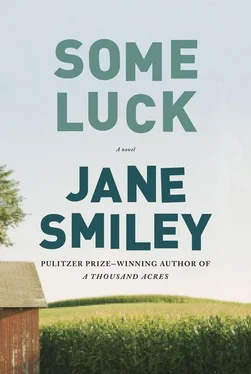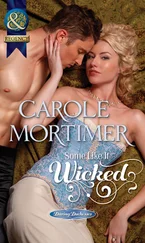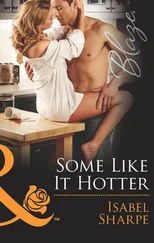Here came the call: “Frankie? Frankie, I don’t see you! Where are you?” He didn’t say a word. And then her shoes appeared, and then the quilt flew up, and then she was dragging him out by his arm and standing him up and slapping her hand down over his back, and she said, “I just ironed that shirt, and look at it — covered with dust! I don’t know what I am going to do with you, Frankie!” She slapped him down again, and held him by the ear as they walked down the stairs. At the bottom, Papa was looking up at them, and he said, “Where was he?”
“Oh, he was in our room.”
“Where?”
“Goodness, Walter, he was just—”
“Was he under the bed?”
“Well—”
“You can’t protect him, Rosanna. He knows not to go under the bed, and you told him ten minutes ago—”
“I’ll just put a sweater on over—”
Then Papa said, “Frank, son, come here. Stand right here.” Papa pointed to the floor just in front of his feet. Mama gave him a little push, and Frank went and stood there.
“Were you under the bed?”
Frank shook his head.
“I’m going to ask you again. Were you under the bed?”
Frank said, “No.” It seemed like the only thing to say.
“Frank, you have been disobedient and you have now told me a fib. What do I have to do now?”
Frank stared at him.
“Come on, tell me what I have to do.”
Frank shook his head again.
Papa said, “I have to whip you.”
Mama said, “We should leave; maybe after—”
“Can’t wait. You punish a horse or a dog five minutes after the fact, and they don’t know what you are punishing them for. Boy’s the same.”
Rosanna stepped back.
Walter took off his belt. Sometimes he used a spoon or a brush, because normally he was wearing overalls, but now he was dressed for going out, and he had a belt. He gripped the belt by the buckle, and Frank had to stand there facing the window while Papa took down Frank’s pants and opened his union suit. Then Papa gripped Frank’s shoulder and the blows began, right across his backside. Frank could count — he got to six before he was too confused by pain to count any further. But he didn’t fall down. Partly, Papa didn’t let him fall down; and partly, Frank didn’t want to fall down. Each time he stumbled forward, Papa stood him up and gave him another one. The tears poured down his cheeks, but he didn’t wipe them on his shirt or his arm. He had to lick them away, though, because they were dripping over his lips. Eventually, it was over, the pain and the fuss. He and Papa stood there quietly, and Papa did up his union suit and pulled up his pants. Then he turned him around so that he was standing right in front of Walter’s knees, and Walter was leaning forward, his eyes alight.
“Frankie,” he said, “why did I whip you?”
“I went under the bed.”
“Why else?”
“Fib.”
“Say, ‘I fibbed.’ ”
Frank hesitated, then said, “I fibbed,” although it had seemed as though the fib just came out of him.
Walter said, “These things don’t just happen, Frankie. They are punishments you incur with disobedience and deception. You are a smart boy and a brave boy, and your mother and I love you very much, but I’ve never seen anyone more determined to have things your own way.” Papa stood up and slid his belt back through the loops and buckled it. Mama appeared with Joey, who looked sleepy.
Frank felt like he was all on fire underneath his pants, but he stood up straight and let the tears dry on his cheeks until Mama took his hand and walked him into the kitchen. She set Joey in the high chair, then she dipped a cloth into the pail of clean water and wiped Frank’s face and dried it. She said, “I don’t understand you, Frankie. I just don’t. You look like an angel, so how does the devil get into you like that?”
Frank said nothing. A few minutes later, they all went out to the buggy and got in, Mama carrying a pie and a loaf of bread. She said, “Well, we should be there by supper, anyway.”
Papa shook the reins at Jake and Elsa and said, “Should be.”
“But they’ll ask why we’re late.”
Papa shrugged. Frank sat back against the cushion.

THE NEW BABY WAS a girl, and she was no trouble at all. Just where her uncommon agreeability came from, her grandmothers could not agree — Walter’s mother, Elizabeth, said it must have come from Rosanna’s side of the family, and, not to be outdone, Rosanna’s mother, Mary, swore it came from Walter’s side. She was named after both her grandmothers — Mary Elizabeth. She had dark hair, but blue eyes. Walter’s mother said, “My grandmother had blue eyes. Blue eyes come and go in our family.” But the Augsbergers and the Vogels, when they all looked at you, it was like looking at the sky on a sunny day. Rosanna stayed in bed for two weeks after Mary Elizabeth was born, not because she was feeling terrible, as she had after Joey, but because it was winter and it was frozen and cold outside and there wasn’t much to do, anyway. Her mother stayed a week, and then Walter’s mother stayed a week, and all she had to do was nap and nurse and sample whatever the mothers had to offer, all varieties of oatmeal, of course, and that was delicious and so soothing, but also pancakes and dried apples boiled up in apple cider with cinnamon and sugar, or waffles (Elizabeth brought along her waffle iron). The happiest Rosanna was, was when she was sitting up on the edge of her bed, nursing the baby, and watching Frank out her window, bundled up to his eyeballs and playing in the snow fort her mother had helped him build in the side yard — the snow was deep and perfect this year, neither icy nor powdery. It was lovely to have the time just to look at the baby, at Mary Elizabeth, and watch her come alive instead of seeing her as a series of tasks and goals, the way she’d seen Frankie and Joey. Walter, too, was happy that it was a girl this time (“Maybe we’ll get a bit of a rest with this one” was what he said). And then Walter’s mother was opening the door and saying, “Rosanna, I made a little chicken broth, so warming. Would you like some?”
FRANKIE AND JOEY WERE sound asleep — Joey was even snoring a little, which Eloise didn’t think a two-year-old would ever do — but Eloise was awake, listening to Rosanna and Walter in the next room talk about a used Model T, which Rosanna wanted Walter to buy but Walter did not want to buy. They had been talking about it for a week. Walter’s position was that he had just spent so much money on seed that, no matter how little the fellow was willing to let it go for, it was too much; Rosanna’s position was that she had twenty-two dollars of her own money, and she knew that Walter had thirty, and the car was five years old.
“I grow fuel for the horses. How am I expected to grow fuel for the car? You want to drive it into town, you have to drive into town to get gasoline to drive it into town.”
Eloise, who liked to drive to the pictures in Usherton with Maggie and George and had now done so several times, didn’t see what need Rosanna had of a car. According to George, a Ford was nearly impossible to learn to operate if you were older than twenty, but Rosanna was sure that she could learn, and in no time, too.
“I could make better use of a tractor, if I had the money,” said Walter, and Eloise thought that he was absolutely right. The farm was three miles from town — you could walk there and back on a nice day. But she had to admire Rosanna, who never raised her voice or lost her temper or even wheedled. She just kept bringing it up, and if Walter got impatient, she would lower her eyes and pipe down. But, sure enough, she brought it up again. “Don’t bother saying no to Rosanna” was what their mother always said, “because it’s not going to get you anywhere.” Especially at midnight, thought Eloise, in the middle of planting season. She turned over and put a pillow over her head.
Читать дальше













